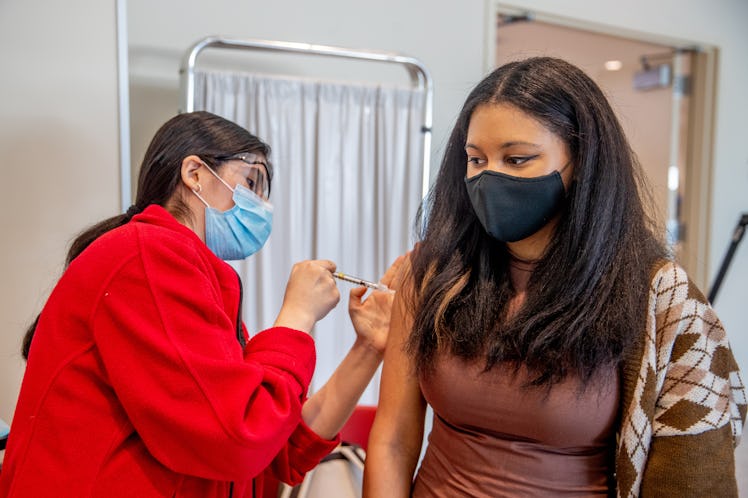
Here's What College Students Should Know About Getting A Booster And The Omicron Variant
Your dorm hall will thank you.
As the coronavirus pandemic continues to tear its way throughout the world, the COVID-19 virus is undergoing multiple changes and mutations. In late November, scientists found a new mutation, dubbed the Omicron variant, which may pose an increased risk. Experts are still studying the Omicron variant to understand how it spreads, as well as the severity of the sickness it causes. As more university students are returning from campus to visit their families during the holidays, many may be wondering: Should college students get a booster shot to protect against the Omicron variant? Here’s what you should know.
On Nov. 26, the World Health Organization (WHO) designated the Omicron variant as one of concern based on its 50 mutations — 32 of which are located on the spike protein that covers the surface of the virus, and is used to attach to and infect human cells. While scientists are still unclear on how effective the existing vaccines might be against this new variant, “the mutations that Omicron carries suggest that the vaccines most likely will be less effective, to some unknown degree, than they were against any previous variant,” per The New York Times.
However, booster shots of COVID vaccines have been proven to significantly raise antibody levels. So while booster shots may not neutralize the Omicron variant completely, they’re still the best way for college students to protect themselves (and their families) from catching and spreading the virus.
“Everybody who is a candidate should get [the booster],” John Swartzberg, MD, Clinical Professor Emeritus of Infectious Diseases and Vaccinology at UC Berkeley, tells Elite Daily. That’s true even without any new variants that are emerging, or may appear in the future. “It’s important to get the booster shot to protect against Delta, which is essentially causing all the disease here in the United States.” As of Dec. 1, the Delta variant is still responsible for the majority of COVID-19 infections globally, per CNBC. “It’s a good idea to get [the booster] for that, and it may be a very good idea to have that added protection if we have to deal with Omicron” in the future, he adds.
He notes that college students may be especially vulnerable to catching and spreading any COVID-19 variants amid closely quartered living environments and cramped campus classrooms. “Because of the communal living, primarily, and because college students ... often will expose themselves to things they don’t need to, that others might be more careful against,” he says, “college students [are] the source of lots of outbreaks on college campuses. More last year than this year. I think we’re doing much better this year.” As of Nov. 30, over 1,000 colleges and universities across the country have implemented vaccine requirements for students — however, none of them currently have mandates for booster shots, according to University Business.
To schedule a vaccine against COVID-19 — whether you’re getting a booster shot or getting vaccinated for the first time — you can visit vaccines.gov, a site supported by both the U.S. Department of Health and Human Services (HHS) as well as the Centers for Disease Control and Prevention (CDC), to find a location providing them. Many local and national pharmacy chains, such as CVS and Walgreens, are also providing booster shots, so you can check directly with your location to see if it’s available.
In addition to obtaining your booster shot, the WHO also recommends still following basic COVID-19 safety protocols: social distance, wear a well-fitting mask, avoid any crowded or poorly ventilated spaces, keep your hands clean, and cough or sneeze into a bent elbow or tissue. By following these health and safety guidelines, you can help keep your loved ones happy and healthy when you go home for the holidays this year.